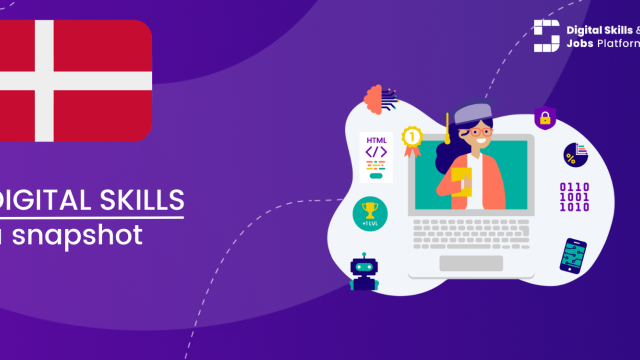Italy: a snapshot of digital skills

Introduction
Italy ranks 25th in Human Capital out of 27 EU Member States in the 2022 edition of the Digital Economy and Society Index (DESI), with a score of 36.6. According to the DESI report, 45.6% of people in Italy have at least basic digital skills. 3.8% of employees are ICT specialists but 55% of companies that hired or tried to hire digital experts report difficulties in filling these vacancies1. The Salesforce's Digital Skills Index 2022 - a study conducted by interviewing over 23,000 workers in 19 countries – shows a percentage that does not differ much from the other results, showing that 86% of Italian workers affirm they do not have the digital skills needed for the world of work of the future.
Italian institutions have also confirmed these numbers and trends. The Observatory of Digital Skills (Osservatorio delle Competenze Digitali) has highlighted how the effects of digitalisation go far beyond the creation of new professions: the weight of digital skills is growing, in fact, in all business areas of all sectors with an average incidence of 13.8%, with peaks touching 63% for specialist digital skills in the 'core' areas of Industry and 41% in Services3.
The DESI indicators for 2022 show that Italy is closing the gap with the European Union in fact of basic digital skills; even today, however, more than half of Italian citizens do not have even basic digital skills. The percentage of digital specialists in the workforce Italy is lower than the EU average, and prospects for the future are weakened by low ICT enrolment and graduation rates. If the EU is to achieve the goal of the Decade digital in terms of basic digital skills and ICT specialists, a decisive step change in Italy's digital skills readiness.
Italy has a National Coalition for digital skills and jobs that builds on ‘Repubblica Digitale’, a multi-stakeholder initiative that promotes digital skills at all levels of the Italian economy and society. The Coalition was launched in April 2020, and since and has since played a key role in the dissemination of digital skills in the country, promoting nationwide training for all citizens, with more than 180 organisations joining the initiative. Among the main initiatives in the framework of the Italian Digital Coalition, a digital skills learning and self-assessment platform named ACCEDI, will be soon launched in 2023.
Overview of state strategies and national initiatives
State strategies
The most important measures and indications at national level concerning digital skills in Italy are contained in the “Italian Strategy for Digital Skills”, published in December 2020. The strategy aims in particular to tackle the cultural digital divide affecting the Italian population through support for digital inclusion, support the e-skills development throughout the higher education and training cycle, promotion of key competences development for the future and the increase of the percentage of ICT specialists in emerging technologies. The Strategy has then been complemented by an Operational Plan including targets for 2025, based mainly on both DESI and Eurostat indicators. Among these targets there are especially:
Equip 70% of the population with at least basic digital skills and bridge the gender skills gap in the ICT sector
To double the rate of Italian citizens with advanced digital skills (78% of young people with higher education, 40% of workers in the private sector and 50% of civil servants)
Increase five times in the share of the population using public digital services (64%)
Increase in the use of the Internet and the ability to use computers also for older people: 84% in the 65-74 age group.
Another important development was the adoption of the Strategic Program on Artificial Intelligence 2022-2024, which includes recommendations to strengthen competences and attract talents.
National initiatives
The Fund for Repubblica Digitale is the most notable Public-Private Partnership (PPP) between the Ministry of Digital Transition, Ministry of Economic Development, and the Association of Banking Foundations. The available resources for the period 2022 – 2026 are 350 million euros. The fund finances projects aiming at developing digital competences, bridge the digital divide among citizens and support the digital transformation of the country. The fund enabled the launch or continuation of initiatives, listed here, such as:
Digital Gyms (Palestre Digitali), a free training course designed to open up new employment horizons for young people and recent graduates towards the digital professions. The training areas range from the vertical ones of digital marketing (SEO, SEA, Social Media Marketing, Digital Strategy, UX, UI, etc.) to the more transversal ones of the world of work (soft skills, startups, effective CV preparation and interviews, etc).
Ready for IT+ targeting NEETs offers a free 4-week introductory programming course, that may be further expanded to a 6-month course most in line with the trainee’s profile, skills, and expectations. For instance, the course is focused on forming professional figures in Java back-end, Full-stack web, data analysis and mobile programming.
CD: 50/50 – Coding Diversity is a non-profit association that promotes the spread of digital skills among young people and is committed to reducing the gap between supply and demand of digital skills in the labour market. In particular, it works on the gender digital divide, which is typically more pronounced in highly digitally intensive sectors (for example, STEM sectors). Participation is free for girls and boys from secondary schools present in the cities where the association operates.
Funding opportunities
Funding opportunities for upskilling and reskilling to support the digital competences of individuals and organizations are available in form of loans, grants and financial instruments. For the period 2021 – 2026 most of the activities in digital transformation are financed through Recovery and Resilience facility but also as activities in Horizon, Erasmus+, ESIF and EEA grant schemes. You may find more on the page in the article on the Digital Skills and Jobs Platform.




